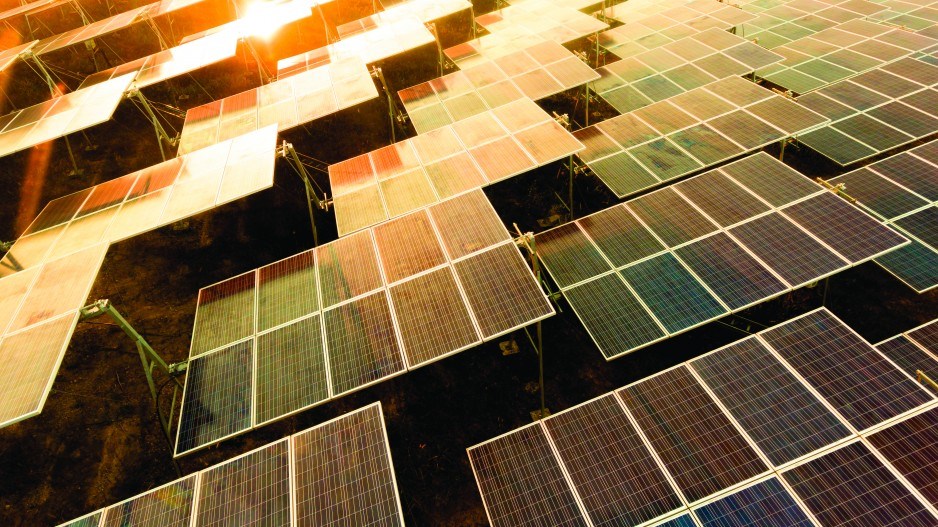Solar power may be more expensive, less reliable and less suited to B.C.’s climate than large-scale hydroelectric energy or even wind power, but that hasn’t curbed British Columbians’ appetite for it.
In response to consumer demand, FortisBC is planning to spend $1 million on a community solar pilot power project in Kelowna. If built, it will be the third such solar power installation in B.C.
Earlier this year, the energy company applied to the BC Utilities Commission (BCUC) for permission to spend $1 million on a 240-kilowatt solar installation.
While FortisBC will provide the upfront cost of building the Ellison Community Solar Pilot Project, customers will pay for it through a voluntary subscription program.
FortisBC provides about 170,000 customers with power in the Okanagan and West Kootenays. Most of the power comes from four hydroelectric dams owned by the company.
While hydro facilities are cheaper to build in B.C. – not to mention more reliable – than solar installations, thanks to an abundance of rivers and lakes, there is a strong consumer demand from customers for solar power, said FortisBC communications adviser Nicole Bogdanovic.
“We saw some interest from our customers,” Bogdanovic said. “Even though the majority of power we provide, we feel it’s from a renewable source, they feel that growing this market is important to them.
“People are interested in solar. They might not be able to put a [solar] rooftop up themselves, they may not want to front the cost, or they’re living in an area where it’s not really a good option.”
According to the U.S. Energy Information Administration, hydro power is still cheaper to build than solar power.
Solar has one advantage over hydro and wind, however: it is highly scalable and versatile. Most homeowners or small communities can’t build hydroelectric dams, but they can install rooftop solar panels or set up small solar farms. The Kanaka Bar Indian Band, for example, recently partnered with Bullfrog Power to build a small, 10-kilowatt solar installation.
The cost of photovoltaic panels has gone down significantly in recent years, and once installed, a private rooftop solar array can save homeowners money on their power bills.
But the upfront costs can be prohibitive for many homeowners, so FortisBC is offering a co-operative approach, with customers opting in to help to pay for it through a subscription service.
Customers who sign up for the program will pay $90 a year to “rent” a single solar panel, and will get back a credit for the energy it produces. The credit is estimated to be around $62, so the annual premium for subscribers will be only about $30 per year per panel.
If it gets the green light, it will be the third community solar power project in B.C.
The first and largest was the SunMine in Kimberley. The one-megawatt solar installation was built at a cost of $5.3 million and has been producing power for two years, supplying enough electricity to meet the needs of more than 200 homes.
More recently, the City of Nelson also powered up a new 60-kilowatt community “solar garden” that local consumers are subsidizing through a voluntary buy-in program. Under that program, subscribers pay $954 up front for a single panel. They then get credited for the power it produces.
The SunMine was subsidized by the provincial government and Teck Resources (TSX:TCK.B), which donated a decommissioned mine site and $2 million.
The province kicked in $1 million through the Innovative Clean Energy fund. The City of Kimberley borrowed $2 million for its share in the project. The SunMine has the potential to expand 200-fold.
“There’s enough space on that brownfield for 200 megawatts,” said Scott Sommerville, Kimberley’s chief administrative officer. “So we can make it 200 times bigger than it is now, which is enough power to power the East Kootenays basically, if we had storage.”
Such an expansion would require power purchase agreements from BC Hydro, however, and so far, Kimberley has commitments from BC Hydro for only two megawatts, which would allow for the current SunMine to double in size, from 4,032 panels to 8,000.
The Ellison Community Solar Pilot Project in Kelowna also has the potential to expand, depending on the demand from customers. Bogdanovic said FortisBC plans to start small and test the market before deciding whether to scale up.
“It will allow us to better understand this market and then we can make decisions about the potential to expand this program,” she said.
Should FortisBC get the green light from the BCUC, Bogdanovic said the company would aim to complete the project by the summer or fall of 2018.




